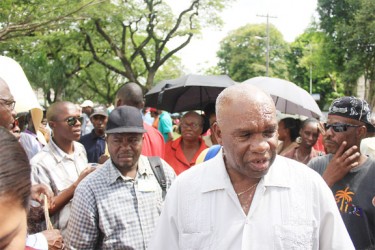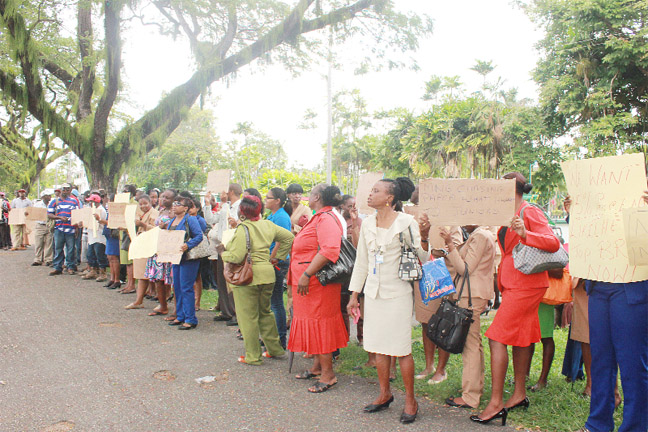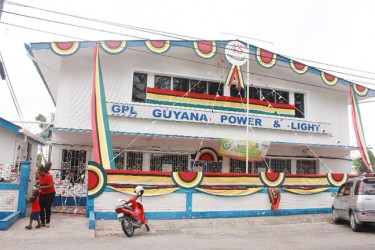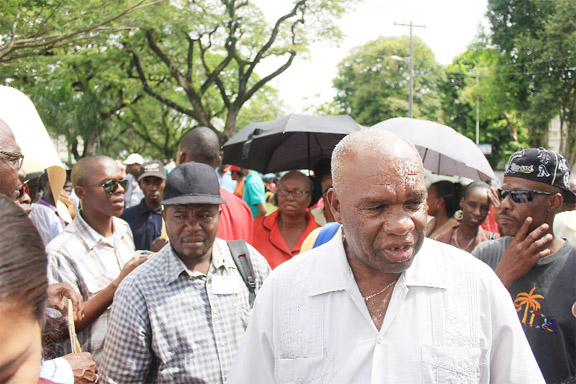Guyana Power and Light company (GPL) workers represented by NAACIE yesterday took to the streets to press for higher wages even as the company said high fuel prices were ruining its bottom line and pointed to a $5B loss last year.

Although blackouts had been reported in several areas yesterday, GPL gave assurances that none of the disruptions were due to the strike.
In a statement, GPL said that “the generation and supply of electricity has not been affected even though (staff) from these areas are on strike.” GPL admitted, however, that its commercial offices were affected but said that these interruptions were non-critical areas easily handled by management.
The power company also appeared unwilling to move on the union’s demands, saying that employees in the National Association of Agricultural, Commercial and Industrial Employees (NAACIE) category already cost the company approximately $1.5Billion annually in remuneration. This, it added, is the highest non-fuel expenditure incurred by the company, amounting to about $1.7million per employee.
It said that though it recognises the value of its employees, any additional increases in salary will have to be funded via tariff increases or government subsidies, which it does now want to consider.
Carrying placards, members of the Commercial, Generation, as well as the Transmission and Distribution departments first convened in front of GPL’s Main Street branch, where they were addressed by NAACIE General Secretary Kenneth Joseph before they marched to the company’s Duke Street Executive Office.
Joseph said that the company was given a long enough time to respect the agreements which were signed by the two entities in 2001, and that GPL’s persistent refusal to honour its obligations has left the union with no other choice but to order those they represent to take action.

Calls made to GPLs Chief Executive Officer (CEO), Bharat Dindyal on the matter proved futile as he was unavailable for a comment.
GPL was presented with an ultimatum by the union to either comply with its agreement by Tuesday, February 26, or see its staff take strike action, but GPL claims it was not informed of the strike actions taken yesterday.

Joseph said that after the company failed to contact him by the deadline, he made contact with its Deputy Chief Executive Officer, who told him he had no new information to provide. This, he said, prompted the workers to take to the streets.
He explained that after a series of meetings held in past weeks, GPL was given 10 days to respond favourably to the union’s demands. The union, Joseph said, has been calling for an 8% across-the-board increase, which includes a 3% annual increment as well as a 3% performance increment.
‘Precarious’
GPL, however, said that the company’s “precarious financial position” prevents it from making such payments, and labeled the union’s demands and actions “unreasonable.” In a statement, the company explained that in negotiations, which started since last September, the union has been demanding a 25% increase across-the-board, annual performance incentives of 3-11%, in-scale increases of 3% as well as increases on allowances ranging from 28% to 100%.
GPL said that a combination of factors, including its financial status and ability to pay the increase and its ability to sustain the increase had to be taken into consideration before it decided what the company could afford to pay.
GPL cited high oil prices as one of the major reasons for its less than favourable financial situation. The company noted that from 2007 to 2012, fuel costs accounted for a large percentage of the company’s sales. Particularly, in 2012, the company said sales were recorded at $29.3Billion, while fuel costs amounted to $24.17Billion. What this means is that 83% of GPL’s financial resources in 2012 went towards purchasing fuel.
The company said that high oil prices continue to plague it to the point where it has resorted to accepting heavy government subsidies and loans to maintain its operations. Again, in 2012, the company said it received $6Billion in subsidies and $5.35Billion in loans. It said that the high oil prices were responsible for the almost $5Billion loss last year, and the projected loss it foresees in 2013. Despite these drawbacks, the company said it has been making all-inclusive payments to NAACIE’s members, which covers annual in-scale increment, across-the-board increases, and the annual performance incentive, covering all three elements in the collective labour agreement. GPL stated that from 2007 to 2011, it has been making all-inclusive payments ranging from 6% to 10% every year.
The company said that a 5% increase was offered for 2012, but it was rejected by the union. After the rejection, the union requested the intervention of Labour Minister Nanda Gopaul, who according to Joseph, bemoaned GPL’s refusal to comply with its 2001 agreements.
Joseph said that the particulars of the agreement signed in 2001 were non-negotiable, and that the employees were prepared to maintain the industrial action until these requests were made. He said that the union’s requests are by no means unreasonable since the company had been making the payments from 2001 to 2006.
This, he said, changed after Dindyal was made Chief Executive Officer of GPL. Joseph said that Dindyal’s approach to negotiations has thus far been abrasive and autocratic, and that he has in many instances tried to bypass the union.
He said that though the agreements made in 2001 were for the period up to 2006, since a new agreement was not signed, the principles of the 2001 agreement should stand.

